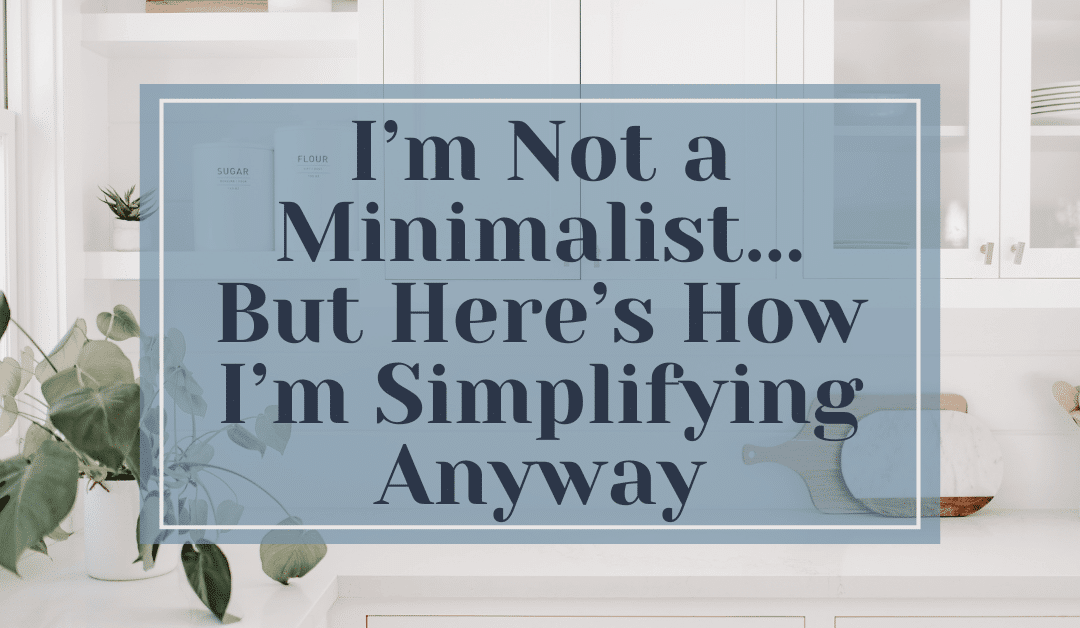First let me start off by saying: I am far from a minimalist. I like cozy spaces, thoughtful décor, and yes, I do have more than a few sentimental knickknacks that spark joy (and maybe collect dust). But lately, I’ve been feeling the weight of too much stuff. Not just physical clutter, but mental and emotional clutter, too.
So while I’m not stripping my home down to a capsule wardrobe and bare countertops, I’ve started to adopt a few minimalist-inspired habits to create a calmer, more organized home and a greater sense of peace in my everyday life. The truth is, you don’t have to be a full-on minimalist to appreciate the benefits of owning less and living more intentionally. If you’re also craving a little breathing room… without giving up everything you own, these are the shifts that have been making a big difference for me.
Letting Go of What I Don’t Need
I’m learning to be more honest with myself about the items I keep “just in case.” If I haven’t used it in the last year, or worse, didn’t even remember I owned it… it’s probably time to let it go.
That said, it gets tricky when you live with someone who doesn’t always share the same mindset. I recently bought a new office chair, and my husband immediately wanted to keep the old one just in case we might need it. I get it—it’s not always easy to part with something that still “works,” even if it’s no longer useful for us. But holding on to too many of those “just in case” items can quickly undo all the progress I’m trying to make.
Side note:I did finally convince him that we didn’t need to hang onto it and the extra space in the basement rec room feels like a small win.
Learning to Say No
Saying no is one of the most underrated ways to simplify life. As I mentioned in my last blog post, I used to feel obligated to say yes to every event, request, or opportunity, even when my plate was full. Now I realize that “no” is a complete sentence, AND an important boundary.
I’m learning that by saying no to things that don’t align with my priorities, I’m actually saying yes to the things that matter most.
If this is something you’re working on too, I explore practical strategies for setting boundaries in my course, Balanced Boundaries, where I share actionable tips for protecting your time and energy.
Asking for Help When I Need It
As someone who likes to be in control of my schedule, tasks, and to-do lists, asking for help doesn’t always come naturally. One of the best lessons I’ve learned, though, is that simplifying life doesn’t mean doing everything myself, it means recognizing when it’s okay to share the load.
Even with my husband, I used to struggle to ask for help. But over time, we’ve gotten better at dividing responsibilities, such as splitting up the driving to activities for the kids—based on who’s available. I’m also learning that in my business, I don’t have to do everything at once. Giving myself permission to slow down, prioritize, and let a few things wait has been a big shift in how I define productivity.
Being More Patient
Slowing down is a work in progress. I often catch myself wanting everything done right now—the decluttering, the organization, the routines. This habit of rushing is deeply ingrained, and it’s not easy to break. But sustainable change takes time. I’m learning (slowly…) to be more patient with the process and with myself.
There’s value in taking small steps instead of burning out from trying to overhaul everything at once.
Staying (Realistically) Organized
Being organized doesn’t mean perfection. It means creating systems that actually work for you. I’m not trying to create a Pinterest-perfect home, I’m just looking for less chaos and more calm. For example, we used to keep a dishrack on the counter at all times, usually piled with clean dishes. It drove me crazy seeing it constantly full and cluttering up the counter, so I recently decided to ditch the dishrack altogether. Now I’m forced to dry and put things away right away, and I can’t believe the difference it’s made in my mood when I walk into the kitchen now.
Even little things like reducing the piles of paper laying around or having a clear spot for frequently used items makes my day run smoother.
Letting Go of the Little Things
I’ve wasted way too much energy stressing over things that ultimately didn’t matter. I’m learning to let the small stuff go – a cluttered drawer, a missed email, or a late start to the morning doesn’t have to derail my whole day. Like when my son misses the bus… (which happens more often than I’d like), we regroup, adjust, and move on.
It’s a mindset shift I’m working to model for my kids, reminding them (and myself) that while certain things may feel like a huge deal in the moment, taking a step back to see the bigger picture often reveals that, in the grand scheme of things, they really aren’t as significant as they seem.
Living More in the Present
It’s easy to get caught up in past regrets or future worries, but neither one helps me simplify my life today. I’m trying to spend more time in the present, whether that means pausing to enjoy a quiet moment or just being fully present with my family instead of mentally running through my to-do list. Even if that means putting my phone down during dinner or not multitasking while my kids are telling me about their day.
The here and now is where the joy lives.
Practicing Gratitude for What I Already Have
The more I focus on what I already have, the less I feel the need to buy more or do more. Gratitude is a powerful mindset shift that’s helping me be content with enough.
Now, I’m not going to lie – I still have a list of improvements I’d like to make around the house and things I’d like to get, however, I’ve come to realize that the comfort of my home, the people I love, and the life we’ve built are more than enough.
Simplifying My Wardrobe
One of my upcoming goals is to revisit my wardrobe. Especially now that I’ve been working from home for the past few years and don’t need the same clothes I used to. I’ve held on to a lot of pieces “just in case,” but realistically, many of them are just taking up space. I’d like to be more intentional about keeping only the clothes I actually wear and feel good in. These days, I mostly dress for comfort, with just enough dressy pieces for the occasional meeting, event or outing. Simplifying my wardrobe will also help reduce laundry loads and make organizing my closet a lot easier.
And – the less clutter in my closet, the fewer decisions I have to make in the morning—and that’s a win.
Enjoying the Journey (Not Just the Outcome)
This whole process isn’t about becoming a perfect minimalist. It’s about creating a life that feels less overwhelming and more aligned with what really matters. I’m learning to enjoy the process of simplifying and not just the results.
Every small change I make feels like a little bit of space reclaimed, both physically and mentally. And that space is where I find peace, clarity, and room to grow.
Final Thoughts
You don’t have to give up everything to benefit from a more minimalist mindset. Small habits such as letting go of what you don’t use, saying no, staying organized, and practicing gratitude, can help simplify your space and your life.
I’m not aiming for minimalism. I’m just aiming for less stress and more ease. And right now, that feels like more than enough.


